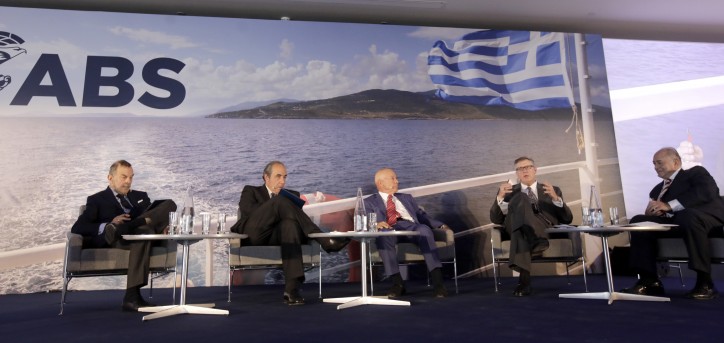Shipping industry giants debated the future of LNG Shipping at ABS’ high-profile panel discussion held at the start of Posidonia 2018 Monday (Jun 04).
Chairman and Chief Executive Officer of Angelicoussis Shipping Group John Angelicoussis; Executive Chairman of Gaslog Ltd. Peter Livanos; Chairman of Dynacom Tanker Management Ltd. George Procopiou; and Chairman Emeritus of Poten and Partners Michael Tusiani joined ABS Chairman, President and CEO Christopher J. Wiernicki for a two-hour discussion: The Future of LNG Shipping: What Matters Most? held at the Stavros Niarchos Foundation Cultural Center.

The exclusively-assembled panelists offered keen insights on a wide range of issues from the business case for investing in LNG, to the impact of shale gas, the prospects for charter and spot rates and future technological trends.
“What we heard today is that LNG has a bright future, and this came directly from the owners and operators who have a decisive role in delivering that future,” said Wiernicki. “ABS is a global leader in LNG, and we have a proud record of investing in developing solutions that help the sector deliver on its significant potential.”
Michael Tusiani opened the discussion stating: “The LNG shipping market has evolved as the value and size of the trade has increased. Larger vessels are now the standard, charterers are moving toward shorter-term periods and the spot market is growing. New owners are moving into the sector, so the question is how much experience will matter to charterers and will they be willing to pay for it.”
John Angelicoussis said: “LNG was an antiquated industry until 2005: what other sector used steam this century? We were a very traditional industry that got better very quickly. Now we have reached a plateau, but the new projects will continue. The gas demand is increasing; there may be a supply/demand mismatch in the short term, but more vessels will be needed than we think.”
Peter Livanos said: “It is inevitable that LNG will be the primary fuel source for marine transport. We need to address the lifecycle of existing assets and bunkering infrastructure which is acting as a brake on adoption, but this should accelerate. The train has left the station and cannot be stopped.”
George Procopiou said: “The LNG shipping business is going through an evolution which is tracking the growth of the commodity and the services around it are becoming commoditised. Natural gas is becoming much more widely appreciated and used; we are in a macro growth trend, it will be one of the main energy sources of the future.”
Wiernicki added: “LNG has done a lot of the heavy lifting in the shipping industry for more than a decade and the improvements in performance have been dramatic. Now we have seen a maturing in the rate of technological change and going forward we will see efficiency gains in how companies use data and digital tools to track the performance of their equipment and assets, and this is where the next big gain will be made across all of shipping not just LNG.”
ABS is a global leader in LNG. As well as being a class leader for LNG carriers, ABS maintains the largest global orderbook for the classification of LNG Carriers. To support the industry in the development of floating storage and regasification units, ABS released its Guide for Building and Classing LNG Regasification Vessels. ABS and GasLog LNG Services Ltd. also completed a joint development project demonstrating a new approach to evaluating LNG boil-off rate. Thanks to this innovative approach, owners are now able to better predict boil-off and account for it in future designs and operation of LNG carriers.
Source: ABS